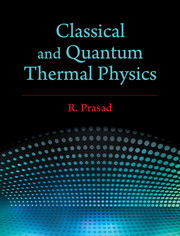Book contents
- Frontmatter
- Dedication
- Contents
- Figures
- Tables
- Preface
- Acknowledgments
- 1 The Kinetic Theory of Gases
- 2 Ideal to a Real Gas, Viscosity, Conductivity and Diffusion
- 3 Thermodynamics: Definitions and the Zeroth Law
- 4 First Law of Thermodynamics and some of its Applications
- 5 Second Law of Thermodynamics and some of its Applications
- 6 Tds Equations and their Applications
- 7 Thermodynamic Functions, Potentials, Maxwell's Equations, the Third Law and Equilibrium
- 8 Some Applications of Thermodynamics to Problems of Physics and Engineering
- 9 Application of Thermodynamics to Chemical Reactions
- 10 Quantum Thermoynamics
- 11 Some Applications of Quantum Thermodynamics
- 12 Introduction to the Thermodynamics of Irreversible Processes
- Index
12 - Introduction to the Thermodynamics of Irreversible Processes
Published online by Cambridge University Press: 23 July 2017
- Frontmatter
- Dedication
- Contents
- Figures
- Tables
- Preface
- Acknowledgments
- 1 The Kinetic Theory of Gases
- 2 Ideal to a Real Gas, Viscosity, Conductivity and Diffusion
- 3 Thermodynamics: Definitions and the Zeroth Law
- 4 First Law of Thermodynamics and some of its Applications
- 5 Second Law of Thermodynamics and some of its Applications
- 6 Tds Equations and their Applications
- 7 Thermodynamic Functions, Potentials, Maxwell's Equations, the Third Law and Equilibrium
- 8 Some Applications of Thermodynamics to Problems of Physics and Engineering
- 9 Application of Thermodynamics to Chemical Reactions
- 10 Quantum Thermoynamics
- 11 Some Applications of Quantum Thermodynamics
- 12 Introduction to the Thermodynamics of Irreversible Processes
- Index
Summary
Introduction
It may be recalled that both classical and quantum thermodynamics consider systems in equilibrium, although theoretically the state of equilibrium takes an infinite time to reach. As such, the classical and quantum thermodynamics describe idealized systems that, in general, do not exist. The concept of reversibility is also very intimately related to the concept of equilibrium as any reversible process passes through a succession of equilibrium states. The fact is that most of the real life phenomenon are non-equilibrium processes and hence irreversible. The branch of science that deals with the flow of energy and mass or both of them between non-equilibrium systems via irreversible paths is called the thermodynamics of irreversible processes. Now there are two possibilities: the non- equilibrium systems involved in the irreversible processes are only marginally away from their equilibrium states or they are far away from their equilibrium states. In the former case the thermodynamics is called the linear thermodynamics of irreversible processes while in the latter case it is termed as the nonlinear thermodynamics of irreversible processes.
Before the modern tools of handling irreversible processes were developed, the method for treating a general problem of thermodynamics was to separate out the truly reversible and irreversible components of the problem and work out the thermodynamics of the truly reversible component ignoring the irreversible component. In some cases both the truly reversible and the irreversible components were analyzed in the frame work of equilibrium thermodynamics. This methodology, though basically wrong, yielded correct results some times, but in some other cases it led to results that were not consistent with observations. However, need for a separate frame work for the treatment of irreversible processes was felt even earlier, and it was L. Onsager (27 Nov 1903–5 Oct, 1976, Norwegian born American physical chemist and theoretical physicist), who in the year 1931 developed mathematical representation of irreversible processes. Onsager was later awarded Nobel Prize of 1968 for this work.
Entropy Generation in Irreversible Processes
One essential difference between a reversible and an irreversible process is that in a reversible process the entropy of the isolated system remains unaltered while in case of an irreversible process it always increases.
- Type
- Chapter
- Information
- Classical and Quantum Thermal Physics , pp. 536 - 566Publisher: Cambridge University PressPrint publication year: 2016



